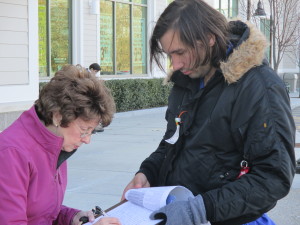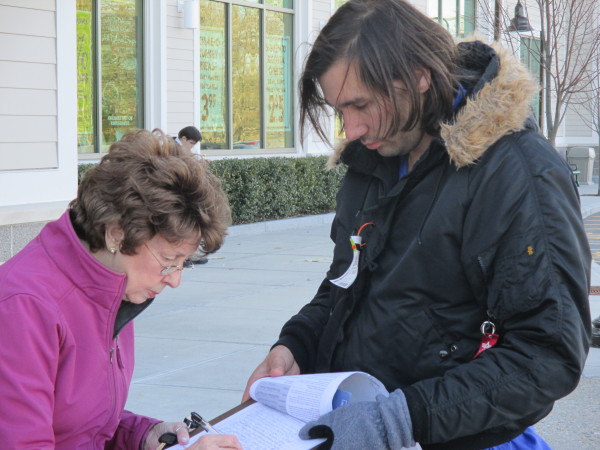BOURNE – This is a flash lesson in modern democracy.
“I can’t talk on the record about my candidate,” said Alex Arsenault, who was gathering signatures outside Market Basket to get a candidate for Congress on the ballot. “But I can talk about the petition industry.”

Loretta Bean of Plymouth signs a petition to get a candidate on the ballot. Alex Arsenault of Somerville, on the right, is a professional petitioner.
Arsenault, 26, of Somerville, was in Bourne, not as a volunteer but rather as a professional petitioner. “It’s really hard to get volunteers to be petitioners,” said Arsenault, who grew up in Amherst, Massachusetts. “Besides, volunteers usually aren’t very good.”
Instead, petitioners get paid per signature by campaigns needing to get candidates or initiatives on the ballot, explained Arsenault. “It varies,” he said of the pay. “It’s usually between two and three dollars per signature.”
“A full time petitioner working across the country can make more than $80,000 a year,” he said. “I know people who make much more.”
Arsenault first volunteered in Amherst in 2008 to gather signatures for an initiative to decriminalize marijuana. “I got involved because I believe in drug law reform,” he said. “It’s time to end the prison-industrial complex.”
But that passion on one issue made him realize that the group he volunteered for was getting paid per signature and he began a freelance business. Now, he said, “I run a team of professional petitioners, usually seven to 10 guys.”
And he is willing to to work on most any issue, for either party. “Even if I don’t believe in a cause, the people who do have a right to be represented on the ballot,” he said. “I’ll help put any candidate on the ballot. I’ll help regardless of their ideology. People should have ballot access.”
This willingness to be a mercenary has gotten him into more than one heated discussion. His answer about what issues are easy or difficult is, “It depends on where you where you are. Medical marijuana in Amherst, Massachusetts was easy,” he said. “Gay marriage in rural Alabama would be hard.”
The toughest climate he faced was in Brattleboro, Vermont where he was gathering signatures for a very conservative candidate, who he would not name. As someone just gathering signatures to get a candidate or issue on the ballot, Arsenault said, “I’ve heard everything.”
Mostly, he said, Republicans will not sign to get Democrats on the ballot and Democrats won’t sign to get Republicans on the ballot. “They’re both closed-minded,” he said. “Independents will sign for anyone.”
He said he has learned to guess people’s political leanings because “different demographics of people dress a certain way. Liberals are the easiest to spot. They dress a certain way, knitted clothing, unconventional eyeglass rims, and they don’t dye their hair if they go gray. Everyone else is harder to spot.”
While liberals and conservatives often refuse to sign for ballot access for their opponents, Arsenault said, “Most people are just like, oh, put them on the ballot,” he said. “But what you get a lot is people have certain issue that they are passionate about and they want to talk about it. They see some guy, me, talking about politics and they think “Why not unload on him?’ “
Running into passionate people is all part of the gig, he said, adding he has heard many conspiracy theories. “People just unload,” he said.
But in Bourne, he said, “The Cape is a politically moderate area of Massachusetts. People are polite, less opinionated and less self important than other areas of Massachusetts. No one tried to talk my ear off.”
Arsenault said he has great endurance and a strategy to be successful. “I do the wave. I do the smile,” he said. “Some people work with a table but I stand. Some are expressive, charismatic, or sweet. There are lots of different styles of petitioners.”
There is also no age limit, he said. “Some of the best petitioners are 65 or older,” he said. “Old people can talk.”
— Brian Tarcy
































Oklahoma is working on a petition to legalize mj.
Which initiative petitioning companies are best? That is a company can put together a team and collect 250,000 signtures in 3 months.
Are you located in hartford ct